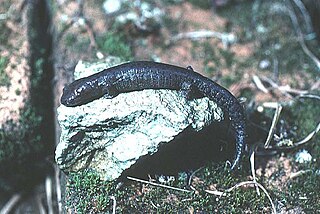Alvarado's salamander, also known as the Moravia de Chirripo salamander, is a species of salamander in the family Plethodontidae.

The Celaque climbing salamander is a species of salamander in the family Plethodontidae. It is endemic to Honduras. Its natural habitat is subtropical or tropical moist montane forests. It is threatened by habitat loss.
The Cerro Pando Salamander is a species of salamander in the family Plethodontidae. It is found in Costa Rica and Panama. Its natural habitat is subtropical or tropical moist montane forests. It is threatened by habitat loss.

Conant's salamander is a species of salamander in the family Plethodontidae. It is endemic to Honduras. Its natural habitat is subtropical or tropical moist montane forests. It is threatened by habitat loss. The males in rare cases can grow a pseudo-penis.
The Tapanti climbing salamander is a species of salamander in the family Plethodontidae, the salamander is endemic to Costa Rica. Its natural habitats are subtropical or tropical, moist lowland forests and subtropical or tropical, moist montane forests. Currently the species is under threat due to habitat loss.
Franklin's climbing salamander is a species of salamander in the family Plethodontidae. It is found in Guatemala and Mexico. Its natural habitat is subtropical or tropical moist lowland forests. It is threatened by habitat loss.
The Rio Quiri salamander is a species of salamander in the family Plethodontidae. It is endemic to Costa Rica. Its natural habitat is subtropical or tropical moist montane forests. It is threatened by habitat loss.

The Holy-mountain salamander is a species of salamander in the family Plethodontidae. It is found in El Salvador, Guatemala, and possibly Honduras. Its natural habitat is subtropical or tropical moist montane forests. It is threatened by habitat loss.
The Guerreran climbing salamander is a species of salamander in the family Plethodontidae. It is endemic to Mexico. It is found on the Pacific slope of the Sierra Madre del Sur in the basins of the Atoyac and Tecpan rivers, between 765 and 2,800 meters elevation. Its extent of occurrence (EOO) is 1,122 km2.
Jackson's climbing salamander is a species of salamander in the family Plethodontidae. It is endemic to Guatemala. Its natural habitat is subtropical or tropical moist montane forests. It is threatened by habitat loss. The salamander is among the 25 "most wanted lost" species that are the focus of Global Wildlife Conservation's "Search for Lost Species" initiative, as it had not been seen since 1975. It was rediscovered in 2017 at an amphibian reserve in the Sierra de los Cuchumatanes.

The Camron climbing salamander, also known as the Camron mushroomtongue salamander or wood colored salamander, is a species of salamander in the family Plethodontidae. It is found in Costa Rica and Panama. Its natural habitat is subtropical or tropical moist lowland forests. It is threatened by habitat loss.

The Mexican climbing salamander is a species of salamander in the family Plethodontidae. It is found in Belize, Guatemala, Honduras, Mexico, and possibly Nicaragua. Its natural habitats are subtropical or tropical dry forests, subtropical or tropical moist lowland forests, subtropical or tropical moist montane forests, plantations, and rural gardens. It is threatened by habitat loss.

The southern banana salamander is a species of salamander in the family Plethodontidae. It is found in Guatemala, Honduras, and Mexico. Its natural habitats are subtropical or tropical moist lowland forests, subtropical or tropical moist montane forests, arable land, and plantations . It is threatened by habitat loss.
O'Donnell's salamander is a species of salamander in the family Plethodontidae. It is found in Guatemala and Honduras. Its natural habitats are subtropical or tropical moist lowland forests, subtropical or tropical moist montane forests, plantations, rural gardens, and heavily degraded former forest. It is threatened by habitat loss.
The robust climbing salamander is a species of salamander in the family Plethodontidae. It is found in Costa Rica and Panama. Its natural habitats are subtropical or tropical moist lowland forests and subtropical or tropical moist montane forests. It is threatened by habitat loss.
Salvin's salamander is a species of salamander in the family Plethodontidae. It is found in El Salvador and Guatemala. Its natural habitats are subtropical or tropical moist lowland forests, subtropical or tropical moist montane forests, pastureland, plantations, and heavily degraded former forest. It is threatened by habitat loss.
The Cukra climbing salamander is a species of salamander in the family Plethodontidae. It is found in Costa Rica, Honduras, and Nicaragua. Its natural habitats are subtropical or tropical moist lowland forests, subtropical or tropical moist montane forests, freshwater marshes, and plantations . It is threatened by habitat loss.
Stuart's Salamander is a species of salamander in the family Plethodontidae, found in Guatemala and Mexico. Its natural habitats are subtropical or tropical dry forests and subtropical or tropical moist montane forests. This salamander is threatened by habitat loss.
The La Palma salamander is a species of salamander in the family Plethodontidae. It is found in Costa Rica and western Panama.
Taylor's climbing salamander is a species of salamander in the family Plethodontidae. It is found in Panama and possibly Colombia. Its natural habitats are subtropical or tropical moist lowland forests and subtropical or tropical moist montane forests.







